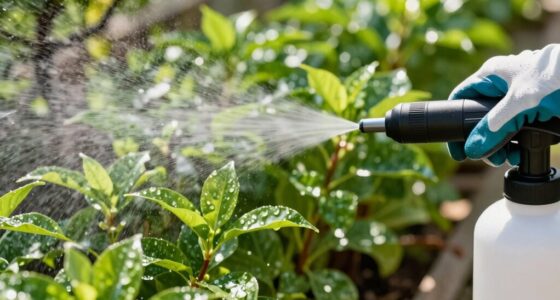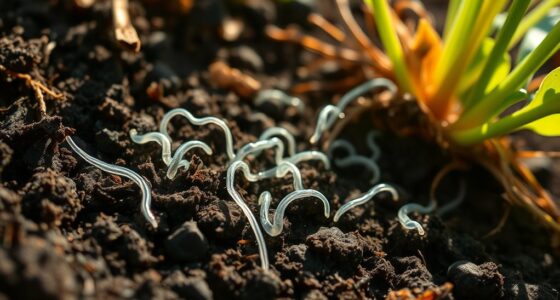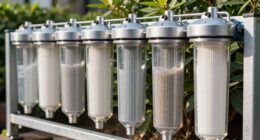Meet your garden’s bodyguards—beneficial nematodes! These microscopic worms naturally hunt down soil pests like grubs, root maggots, and beetle larvae. By applying them with water to moist soil, you activate their pest-fighting skills. They enter pests’ bodies and release bacteria, killing them within days. This eco-friendly method improves soil health and reduces chemical use. Want to discover how to make these natural allies work best in your garden? Keep exploring!
Key Takeaways
- Beneficial nematodes are microscopic worms that naturally target and kill soil-dwelling pests like grubs and beetle larvae.
- They enter pests through natural openings and release bacteria that rapidly kill them within days.
- Application involves mixing nematodes with water and applying to moist soil during cooler parts of the day.
- Regular reapplication helps prevent pest resurgence and maintains a healthy, pest-free garden ecosystem.
- Using beneficial nematodes promotes eco-friendly pest control, reducing reliance on chemical pesticides and supporting soil health.

Beneficial nematodes are microscopic roundworms that naturally help control soil-dwelling pests in your garden or lawn. These tiny allies are effective, eco-friendly pest control methods that can considerably improve your soil health. Unlike chemical pesticides, beneficial nematodes target pests specifically, reducing harm to beneficial insects, plants, and the environment. When you introduce them into your soil, you’re providing your garden with a natural, sustainable way to manage pests without compromising soil quality.
Beneficial nematodes are eco-friendly, microscopic helpers that naturally control soil pests and boost garden soil health.
To get started, you’ll want to understand which pests you’re dealing with. Beneficial nematodes are particularly effective against pests like grubs, root maggots, billbugs, and certain beetle larvae. Once you identify your pest problem, you can select the right species of nematodes for the job. These microscopic worms enter pests’ bodies through natural openings, releasing bacteria that kill the host within a few days. This method guarantees that pests are eliminated efficiently, without the need for chemical interventions that might disrupt your soil fertility or harm non-target organisms.
Applying beneficial nematodes is straightforward. You typically mix them with water and apply the solution to moist soil, ideally during cooler parts of the day to prevent dehydration. It’s important to keep the soil consistently moist after application, as dry conditions can hinder their movement and effectiveness. You’ll want to avoid applying nematodes during extreme heat or drought, since these conditions can reduce their survival rate. Once in the soil, they seek out pests, actively hunting and infecting them. Over the next few days, you’ll notice a decline in pest populations, leading to healthier plants and improved soil health.
Using beneficial nematodes also aligns with integrated pest management practices, which emphasize combining multiple pest control methods for a balanced, sustainable approach. They work well alongside other organic methods like crop rotation, composting, and encouraging natural predators. This holistic approach not only keeps pests in check but also enhances your soil’s vitality, creating a more resilient garden ecosystem. Because nematodes are living organisms, it’s essential to apply fresh batches periodically, especially if you notice pest resurgence.
Frequently Asked Questions
Are Beneficial Nematodes Safe for Pets and Children?
You might wonder if beneficial nematodes are safe for pets and children. Rest assured, these natural predators target soil pests without harming humans or animals. For pet safety and children’s health, beneficial nematodes pose minimal risk when used correctly. Just avoid direct contact with the soil immediately after application. Overall, they’re a safe, eco-friendly way to protect your garden without jeopardizing your family’s well-being.
How Long Do Beneficial Nematodes Remain Effective in the Soil?
Beneficial nematodes typically stay effective in the soil for about 2 to 3 weeks, but their longevity can vary based on soil conditions and application frequency. To maintain pest control, you should reapply them every few weeks, especially after heavy rain or watering that can wash them away. Regular applications ensure continuous protection, as nematodes don’t have a long-lasting presence in the soil without reapplication.
Can Beneficial Nematodes Control All Types of Garden Pests?
Think of beneficial nematodes as skilled detectives, but not all are trained for every case. Their pest specificity means some target specific pests, while others have broader nematode diversity. You can’t rely on them for every pest problem, but they’re excellent for tackling certain soil-dwelling pests. By understanding their limits, you can deploy the right nematodes to protect your garden effectively.
What Environmental Conditions Favor the Success of Nematode Applications?
You want your beneficial nematodes to work effectively, so guarantee the environment favors their success. Keep soil moisture consistent, as nematodes thrive in moist conditions. Maintain ideal temperature ranges, usually between 55-85°F (13-29°C), to support their activity. Avoid application during heavy rain or drought, which can hinder their movement and survival. Properly preparing the soil with adequate moisture and timing applications during suitable temperature conditions boost their pest control efficiency.
How Often Should I Apply Beneficial Nematodes for Ongoing Pest Control?
Think of beneficial nematodes as vigilant guardians patrolling your garden’s shadows. For ongoing pest control, you should apply them every 2 to 4 weeks, depending on pest pressure and environmental conditions. Their lifespan is roughly two to three weeks, so regular applications keep your garden protected. Consistent application frequency guarantees these tiny defenders stay active, maintaining a continuous line of defense against soil-dwelling pests.
Conclusion
Now that you know your garden’s tiny defenders, you can confidently protect your plants without chemicals. Beneficial nematodes are silent warriors—powerful yet gentle, natural yet effective. They work underground, unseen but relentless, fighting pests while nurturing your soil’s health. Embrace these microscopic allies; they’re your first line of defense, your quiet guardians. In a world of pesticides and chemicals, let these beneficial nematodes remind you that nature’s smallest heroes often make the biggest difference.









